THE COMMERCIAL MOTOR
Page 9
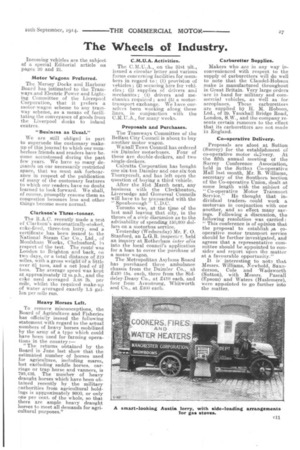
Page 10
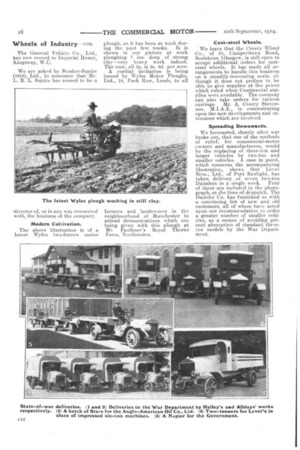
Page 11
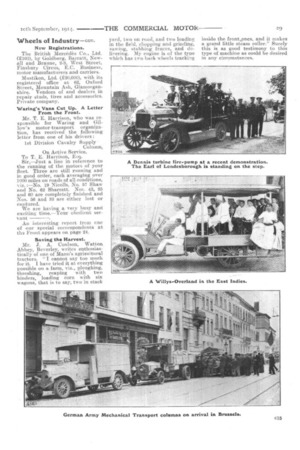
Page 12
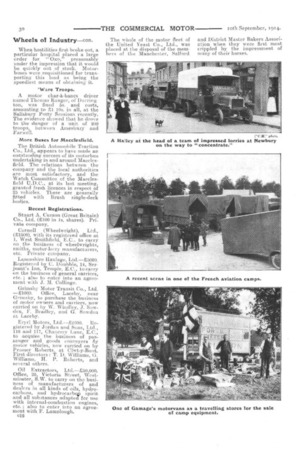
Page 13
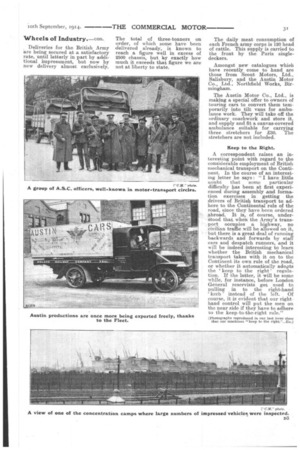
If you've noticed an error in this article please click here to report it so we can fix it.
The Wheels of Industry.
C.M.U.A. Activities. Incoming vehicles are the subject of a special Editorial article OA pages 20 and 21.
Motor Wagons Preferred.
The Mersey Docks and Harbour Board has intimated to the Tramways and Electric Power and Lighting Committee of the Liverpool Corporation, that it prefers a motor-wagon scheme to any tramway scheme, as a means of facilitating the conveyance of goods from the Liverpool docks to inland centres.
"Business as Usual."
We are still obliged in part. to supersede the customary makeup of this journal to which our numberless friends and readers -have become accustomed during the past few years. We have so many demands on our necessarily restricted space, that we must ask forbearance in respect of the publication of many of the customary features to which our readers have no doubt learned to look forward. We shall, of course, promptly resume them as congestion becomes less and other things become more normal.
Clarkson's Three -t onner.
The R.A.C. recently made a test of Clarkson's automatically-stoked, coke-fired, three-ton lorry, and a certificate has been issued to the National Steam Car Co., Ltd., of Moulshain Works, Chelmsford, in respect of the test. The routd was London to Brighton and back, on two days, or a total distance of 210 miles, with a gross weight Of a little over 61 tons, and a net load of 2.tons. The average speed was kept at approximately 12 m.p.h., and the coke used averaged 3.88 lb. per mile, whilst the requieed make-up of water averaged exactly 1.5 gallon per mile run.
Heavy Horses Left.
To remove misconceptions, the Board of Agriculture and Fisheries has officially issued the following statement with regard to the actual numbers of heavy horses mobilized by the army of a type which could have beenused for farming operations in the country:—
" The returns obtained by the Board in June last show that the estimated number of horses used for agriculture, including mares, but excluding saddle horses, carriage or trap horse and vanners, is 793,436. The number of heavy draught hors-es which have been obtained recently by the military authorities from agricultural holdings is approximately 9000, or only one per cent. of the whole, so that there are ample heavy draught horses to meet all demands for agricultural purposes."
The C.M.U.A., on the 31st ult., issued a circular letter and various forms concerning facilities for members in regard to : (1) provision of vehicles ; (2) securing hire for vehicles; (3) supplies of drivers and mechanics ; (4) drivers and mechanics required ; and 5) a motortransport exchange. IN e have ourselves been working along these lines, in .conjunctioti with the C.M.U.A., for many weeks.
Proposals and Purchases.
The Tramways Committee of the Belfast City Council is about to buy another motor wagon.
Walsall Town Council has ordered six Daimler motorbuses. Four of these are double-deckers, and two single-deckers. Calcutta Corporation has bought one six-ton Daimler and one six-ton Thornycroft, and has left open the question of buying a third vehicle.
After the 31st March next, any business with the Cleckheaton, Liversedge and Gomersal Councils will have to be transacted with the " Spenb °rough "L.D.C.
Toronto was, at the time of the last mail leaving that city, in the throes of a civic discussion as to the advisability of spending 150,000 dollars on a motorbus service.
Yesterday (Wednesday) Mr. F. 0. Stanford, an L,G.B. inspeetcr, held an inquiry at Rotherham inter ail% into the local council's application for a loan to cover the purchase of a motor wagon. The Metropolitan Asylums Board has purchased three ambulance chassis from the Daimler Co., at 2430 15s. each, three from the Siddeley-Deasy Co., at 2410 each, and four from Armstrong, Whitworth and Co., at 2400 each. Carburetter Supplies.
Makers who are in any way inconvenienced with respect to the supply of carburetters will do well to note that the Claudel-Hobson make is manufactured throughout in Great Britain. Very large orders a-re in hand for military and commercial vehicles, as well as for aeroplanes. These carburetters are supplied by H. M. Hobson, Ltd., of 29, Vauxhall Bridge Road, London, S.W., and the company resents certain rumours to the effect that its carburetters are not made in England.
Co-operative Delivery.
Proposals are afoot at Sutton (Surrey) for the establishment of co-operative motor ele2ivery. At the fifth annual meeting of the Surrey Conference Association, held in the Sutton Co-operative Hall last month, Mr. B. Williams, secretary of the Southern Isection of the Co-operative Union, dealt at some length with the subjent of "Co-operative Motor Transoort Service. ' He thought that individual traders, could work a motorvan in conjunction with one another, and so effect many savings. Following a discussion, the following resolution was carried : "This conference is of opinion that the proposal to establish a cooperative motor transport service should be further investigated, and agrees that a representative committee should be appointed to consider and report upon the matter at a favourable opportunity."
It is. interesting to note that Messrs. Williams, Newbold, Saunderson, Cole and -Wadsworth (Sutton), with Messrs. Pascal] (Epsom) and Waters (Haslemere), were appointed to go further into the matter.
The General Vehicle Co., Ltd., has now moved to Imperial House, Kingsway, W.C.
We are asked by Straker-Squire (1913), Ltd., to announce that Mr. L. R. L. Squire has ceased to be a director of, or in any way connected with, the business of the company.
Modern Cultivation.
The above illustration is of a latest Wyles two-furrow motor plough, as it has been at work dur ing the past few weeks. It is shown in our picture at work ploughing 7 ins, deep of strong clay—very heavy work indeed. The cost, all in, is 3s. 6d, per acre. A cordial invitation is being issued by Wyles Motor Ploughs, Ltd., 18, Park Row, Leeds, to all farmers and landowners in the neighbourhood of Manchester to attend demonstrations which are being given with this plough at Mr. Faulkner's Royal Thorne Farm, Northenden. Cast-steel Wheels.
We learn that the Creery Wheel Co., of 83, Camperdown Road, Scotstoun, Glasgow, is still open to accept additional orders for caststeel wheels. It has made all arrangements to handle this business on a. steadily-increasing scale, although it does not profess to he able to give supplies at the prices which ruled when Continental supplies were available. The company can also take orders for various castings. Mr. A. Creery Stevenson, M.I.A.E., is concentrating upon the new developments and extensions which are involved.
Spreading Downwards.
We forecasted, shortly after war broke out, that one of the methods of relief, for commercial-motor owners and manufacturers, would be the replacing of three-ton and larger vehicles by two-ton and smaller vehicles. A case in point, which concerns the accompanying illustration, shows that Lever Eros., Ltd., of Port Sunlight, has taken delivery of seven two-ton Daimlers in a single week. Four of these are included in the photograph, at the time of despatch. The Daimler Co. has furnished us with a convincing list of new and old customers, all of whom have acted upon our recommendation to order a greater number of smaller vehicles, as a means of avoiding present absorption of standard threeton models by the War Department. New Registrations.
The British Mercedes Co., Ltd. (i100), by Goldberg, Barratt, Newall and Braune, 2-3, West Street, Finsbury Circus, E.C. Business, motor manufacturers and carriers.
Mustikon, Ltd. (220,000), with its registered office at 62, Oxford Street., Mountain Ash, Glamorganshire. Vendors of and dealers in repair studs, tires and accessories. Private company.
Waring's Vans Cut Up. A Letter From the Front.
Mr. T. E. Harrison, who was responsible for Waring and Gillow's motor-transport organization, has received the following letter from one of his drivers : 1st Division Cavalry Supply Column, On Active Service.
To T. E. Harrison, Esq.
Sir,—Just a line in reference to the running of the motors of your fleet. Three are still running and in good order, each averaging over 2000 miles on roads of all conditions, viz. :—No. 19 'Nicol's, No. 57 Shaw and No. 62 Sharratt. Nos. 42, 25 and 60 are completely finished and Nos. 58 and 33 are either lost Or captured. We are having a very busy and exciting time.—Your obedient ser
vant An interesting report trom. one of our special correspondents at thc Front appears on page 24.
Saving the Harvest.
Mr. J. A. Coulson, Watton Abbey, Beverley, writes enthusiastically of one of Mann's agricultural tractors. "I cannot say too much. for it. I have tried it at everything possible on a farm, viz., ploughing, threshing, reaping with two binders, loading corn with six wagons, that is to say, two in stack
yard, two on road, and two loading in the field, chopping and grinding, sawing, stubbing fences, and delivering. My engine is of the type which has two back wheels tracking inside the front,pnes. and it makes a grand little steam roller." Surely this is as good testimony to this type of machine as could be desired in any circumstances. When hostilities first broke out, a particular hospital placed a large order for " Oxo," presumably under the impression that it would be quickly out of stock. Motorbuses were requisitioned for transporting this load as being the speediest means of obtaining It.
'Ware Troops.
A motor char-h-bancs driver lamed Thomas Ranger, .of D orring. ton, was fined 5s. and costs, amounting to 5;1 10s. in all, at the Salisbury Petty Sessions recently.. The evidence showed that he drove to the danger of a unit of 200 troops, between Amesbury and -Farwell.
More Buses for Macclesfield.
The British Automobile Traction Co., Ltd., appears to have made an outstanding success of its motorbus undertaking in and around Macclesfield. The relations between the company and the local authorities are most satisfactory, and the Watch Committee of the Macclesfield U.D.C., at its last meeting, granted fresh licences in respect of 25 vehicles. These are generally fitted with Brush single-deck bodies.
Recent Registrations.
Stuart A. Curzon (Great Britain) Co., Ltd. (.1;l00 in is. shares). Private company.
Cornell (Wheelwright), Ltd.,. (21500), with its registered office at 1, West Smithfield, E.C.. to carry on the business of wheelwrights, smiths, niotor-lorry manufacturers, etc. Private company.
Lancashire Haulage, Ltd.—X3000. Registered by C. Doubble, 14, Ser. je.ant's inn, Temple, E.C., to carry on the business of general carriers, etc. ; also to enter into an agreement with J. M. Collinge.
Grimsby Motor Transit Co., Ltd. --1000. Office, Laceby, near Grimsby, to purchase the business of motor owners and carriers, now carried on by W. Windley, J. Sowden, E. Bradley, and G. Sowden at Laceby.
Eryrl Motors, Ltd.--i.2000. Registered by Jordan and Sons, Ltd., 116 and ill, Chancery Lane, E.C., to acquire the business of passenger and goods conveyers 4y motor vehicles, now carried on by Prosser Roberts, at CIwt-y-Bont. First directors T. D. Williams, (3. Williams, H. P. Roberts, and several others.
Oil Extractors, Ltd.—X50,000. Office, 25, Victoria Street, Westminster, S.W. to carry on the business of manufacturers of and dealers in all kinds of oils, hydrocarbons, and hydrocarbw spirit and all substances adapted for use with internal-combustion engines, etc. ; also to enter into an agreement with F. Lamplough.
(.116 The whole of the motor fleet of the United Yeast Co., Ltd., was placed at the disposal of the members of the Manchester, Salford and District Master Bakers Association when they were first most crippled by the impressment of many of their horses.
Deliveries for the British Army are being secured at a. satisfactory rate, until latterly in part by additional impressment, but now by new delivery almost exclusively. The total of three-tonners on. order, of which some have been delivered already, is known to reach a figure well in excess of 2500 chassis, but by exactly how much it exceeds that figure we are not at liberty to state. The daily meat consumption of each French army corps is 120 head of cattle. This supply is carried to the front by the Paris singledeckers.
Amongst new catalogues which have recently come to hand are those from Scout Motors, Ltd., Salisbury, and the Austin Motor Co., Ltd., Northfield Works, Birmingham.
The Austin Motor GO., Ltd., is making a special offer to owners of touring cars to convert them 'temporarily into tilt vans for ambulance work. They will take off the ordinary coachwork and store it, and supply and fit a canvas-covered ambulance suitable for carrying three stretchers for 130. The stretchers are not included.
Keep to the Right.
A correspondent raises an interesting point with regard to the considerable employment of British mechanical transport on the Continent. In the course of an interesting letter he says : "I have little aoubt that some particular difficulty has been at first experienced during assembly and formation exercises in getting the drivers of British transport to adhere to the Continental rule of the road, since they have been ordered abroad. It is, of course, understood that when the Army's transport. occupies a. highway, no civilian traffic will be allowed on it, but there is a great deal of running backwards and forwards by staff cars and despatch runners, and it will be indeed interesting to learn whether the British mechanical transport takes with it on to the Continent its own rule of the road, or whether it automatically adopts the 'keep to the right' regulation. If the latter, it will be some while, for instance, before London. General reservists get used to pulling in to the right-hand
'kerb ' instead of the left. Of course, it is evident that our right. hand control will put the men on the near side if they have to adhere to the keep-to-the-right rule."
[Photographs reproduced in our last issue show that our machines "keep to the right."_Eml


















